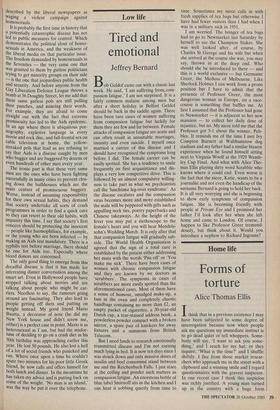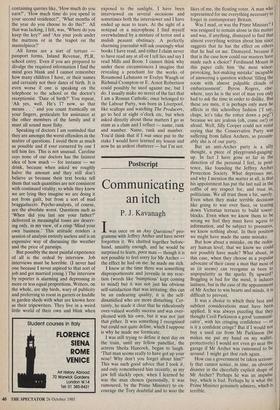Home life
Forms of torture
Alice Thomas Ellis
Ithink that in a previous existence I may have been subjected to some degree of interrogation because now when people ask me questions my immediate instinct is to go dead quiet or tell whoppers. Some- body will say, 'I want to ask you some- thing,' and I reach for my hat; or they inquire, 'What is the time?' and I shuffle shiftily. I flee from those market resear- chers who approach me in the street with a clipboard and a winning smile and I regard questionnaires with the gravest suspicion. In one recent case I think this suspicion was richly justified. A young man turned up in the country with a huge form containing queries like, 'How much do you earn?', 'How much time do you spend in your second residence?', 'What months of the year do you choose to do this?'. All that was lacking, I felt, was, `Where do you keep the key?' and `Are your jools under the mattress or in the teapot on the mantelpiece?'
All forms are a sort of torture passport forms, Inland Revenue, PLR, school entry. Even if you are prepared to divulge the required information I find the mind goes blank and I cannot remember how many children I have, or their names and certainly not their dates of birth. It is even worse if one is speaking on the telephone to the school or the doctor's receptionist. `Date of birth?' You repeat, `Ah yes, well. He's 17 now, so that means . . .' and you count frantically on your fingers, gesticulate for assistance at the other members of the family and it must all sound most fishy.
Speaking of doctors I am reminded that they are amongst the worst offenders in the matter of questions. I avoid them as much as possible and if ever cornered by one I tell him lies. This is not unusual. Caroline says none of our doctors has the faintest idea of how much — for instance — we drink, because when asked we roughly halve the amount and they still don't believe us because their text books tell them that such quantities are not consistent with continued vitality; so while they know we are lying they imagine we are doing it not from guilt, but from a sort of mad braggadaccio. Psycho-analysts, of course, are the absolute worst. Questions such as `When did you last see your father?' delivered in meaningful tones are deserv- ing only, in my view, of a crisp `Mind your own business.' This attitude renders a session of analysis entirely useless and is an expensive way of discussing the weather and the price of parsnips.
But possibly the most painful experience of all is the ordeal by interview. Job interviews must be horrible. (I never had one because I never aspired to that sort of job and got married young.) The interview by reporter is alarming and depressing in more or less equal proportions. Writers, on the whole, are shy birds, wary of publicity and preferring to roost in garrets or huddle in garden sheds with what are known here as their tripewriters. They live in a weird little world of their own and blink when exposed to the sunlight. I have been interviewed on several occasions and sometimes both the interviewer and I have ended up near to tears. At the sight of a notepad or a microphone I find myself overwhelmed by a mixture of terror and a mulish peasant obstinacy. A perfectly charming journalist will ask coaxingly what books I have read, and either I claim never to have read any at all or I tell lies and say I read Mills and Boon. I cannot think why under these circumstances I imagine that revealing a penchant for the works of Rosamond Lehmann or Evelyn Waugh or Richmal Crompton or E. Arnot Robertson could possibly be used against me, but I do. I usually make no secret of the fact that I am a Roman Catholic, once belonged to the Labour Party, was born in Liverpool, like scallops and watching The Producers, go to bed at eight o'clock etc, but when asked directly about these matters I go as stum as a clam and I reflect — name, rank and number. Name, rank and number. You'd think that if I was once put to the stake I would have learned my lesson and now be an ardent chatterer — but I'm not.



























































 Previous page
Previous page